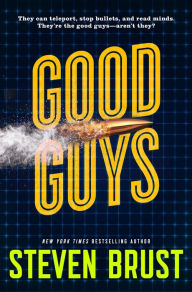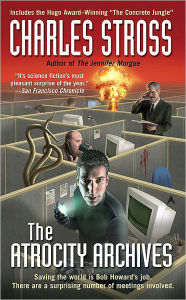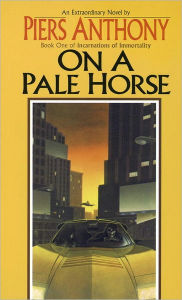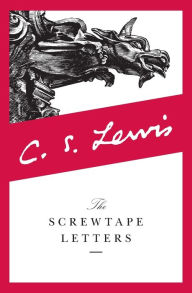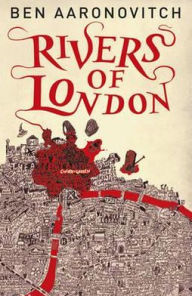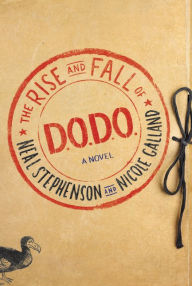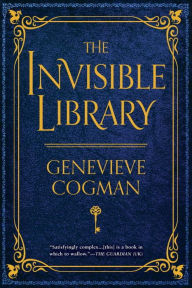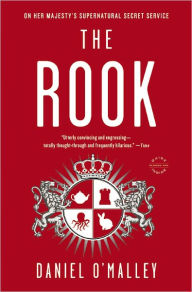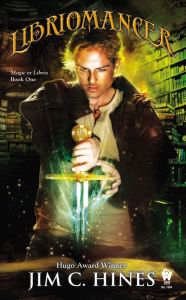The Magical Bureaucracies with the Most Paperwork
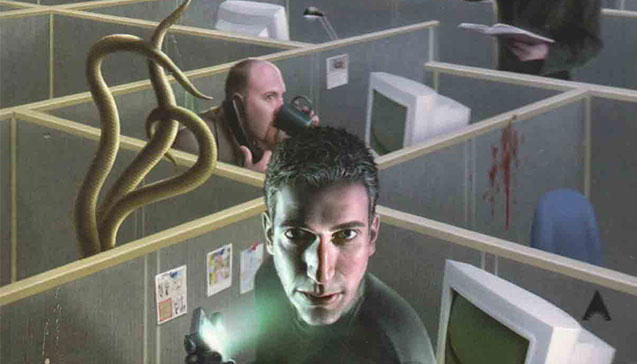 You might be forgiven for assuming that magic is, well, magic—a supernatural ability to do things that violate the laws of reality. That is a pretty good description of magic, which is awesome. Except if you’re a writer, in which case it becomes a problem: once you introduce magic into your story, you must come up with ways to control it, lest all your books quickly become works of flash fiction ending with variations of the sentence, “and then he cast a spell and the monster disappeared in a flash of smoke.
You might be forgiven for assuming that magic is, well, magic—a supernatural ability to do things that violate the laws of reality. That is a pretty good description of magic, which is awesome. Except if you’re a writer, in which case it becomes a problem: once you introduce magic into your story, you must come up with ways to control it, lest all your books quickly become works of flash fiction ending with variations of the sentence, “and then he cast a spell and the monster disappeared in a flash of smoke.
That control comes in many forms. Sometimes it’s an equally magical villain. Sometimes, magic is bound by convoluted rules or physical limitations. And sometimes, magic is kept in check by the most irresistible force in the known universe: bureaucracy. As anyone who’s ever tried to appeal a health insurance claim knows, paperwork can take the wonder out of anything—even magic. But there are levels of paperwork, even in a magical bureaucracy. The ten organizations listed here may not be the most effective, the most dangerous, or even the most famous magical bureaucracies, but they definitely produce the most paperwork.
Good Guys
Good Guys
By Steven Brust
Hardcover $25.99
The Foundation (The Good Guys, by Steven Brust)
Brust’s latest brilliantly mixes the mind-numbing paperwork hell of a truly officious bureaucracy into a gripping procedural investigation involving a magical assassin, demonstrating an understanding of how paperwork-fueled organizations can be both amazing and eternally frustrating. The Foundation regulates magic in Brust’s imagined universe, but it does so on the shoestringiest of budgets; seemingly every paperclip requested by agents Donovan, Marci, and Susan (who were each recruited by The Foundation when their own supernatural abilities made themselves known) requires documentation and justification. Brust is smart enough to know that “paperwork” is just a symbol—and the Foundation throws more than just busywork in the way of its own people, happily using Skype chats and other modern-day obstacles to transform the process of using magic into something less than magical.
PAPERWORK SCORE: a perfect 10
The Foundation (The Good Guys, by Steven Brust)
Brust’s latest brilliantly mixes the mind-numbing paperwork hell of a truly officious bureaucracy into a gripping procedural investigation involving a magical assassin, demonstrating an understanding of how paperwork-fueled organizations can be both amazing and eternally frustrating. The Foundation regulates magic in Brust’s imagined universe, but it does so on the shoestringiest of budgets; seemingly every paperclip requested by agents Donovan, Marci, and Susan (who were each recruited by The Foundation when their own supernatural abilities made themselves known) requires documentation and justification. Brust is smart enough to know that “paperwork” is just a symbol—and the Foundation throws more than just busywork in the way of its own people, happily using Skype chats and other modern-day obstacles to transform the process of using magic into something less than magical.
PAPERWORK SCORE: a perfect 10
The Atrocity Archives (Laundry Files Series #1)
The Atrocity Archives (Laundry Files Series #1)
Paperback $8.99
The Laundry (The Laundry Files, by Charles Stross)
In a way, the books and stories set in Stross’ Laundry Files world are really the exciting bits amid an endless bureaucratic nightmare faced by the workers at The Laundry—the government agency charged with protecting the world from a long list of otherworldly horrors. Yes, they save the world here and there, but it’s strongly suggested that protagonist Bob Howard and colleagues spend most of their time tied up in endless meetings, filling out endless paperwork, and attending endless meetings about discrepancies in the endless paperwork—so much so that when a nest of vampires or some other atrocity shows up, it’s kind of a relief.
PAPERWORK SCORE: 9/10
The Laundry (The Laundry Files, by Charles Stross)
In a way, the books and stories set in Stross’ Laundry Files world are really the exciting bits amid an endless bureaucratic nightmare faced by the workers at The Laundry—the government agency charged with protecting the world from a long list of otherworldly horrors. Yes, they save the world here and there, but it’s strongly suggested that protagonist Bob Howard and colleagues spend most of their time tied up in endless meetings, filling out endless paperwork, and attending endless meetings about discrepancies in the endless paperwork—so much so that when a nest of vampires or some other atrocity shows up, it’s kind of a relief.
PAPERWORK SCORE: 9/10
Harry Potter and the Sorcerer's Stone (Harry Potter Series #1)
Harry Potter and the Sorcerer's Stone (Harry Potter Series #1)
By
J. K. Rowling
Illustrator
Mary GrandPré
Paperback
$8.99
$10.99
The Ministry of Magic (Harry Potter, by J.K. Rowling)
You could lay out a pretty convincing case that the Harry Potter books are as much a critique of government processes as anything else; certainly the way the Ministry of Magic is depicted all but proves the point. While in the early going the MoM is presented as kind of cutely officious, as the series progresses, it’s rigid way of doing things becomes increasingly harmful. As in any officious organization, the bureaucrats of the MoM seek to preserve their jobs and privileges above all else, thus allowing someone like Dolores Umbridge to transform Hogwarts into a fascist bureaucratic hell filled with protocols and restrictions. However, while Umbridge and the MoM are undoubtedly examples of just how awful a magical bureaucracy would be, these are magicians, after all, so there’s not as much red tape as you might think.
PAPERWORK SCORE: 6/10
The Ministry of Magic (Harry Potter, by J.K. Rowling)
You could lay out a pretty convincing case that the Harry Potter books are as much a critique of government processes as anything else; certainly the way the Ministry of Magic is depicted all but proves the point. While in the early going the MoM is presented as kind of cutely officious, as the series progresses, it’s rigid way of doing things becomes increasingly harmful. As in any officious organization, the bureaucrats of the MoM seek to preserve their jobs and privileges above all else, thus allowing someone like Dolores Umbridge to transform Hogwarts into a fascist bureaucratic hell filled with protocols and restrictions. However, while Umbridge and the MoM are undoubtedly examples of just how awful a magical bureaucracy would be, these are magicians, after all, so there’s not as much red tape as you might think.
PAPERWORK SCORE: 6/10
On a Pale Horse (Incarnations of Immortality #1)
On a Pale Horse (Incarnations of Immortality #1)
In Stock Online
Paperback $8.99
The Entire Universe (The Incarnations of Immortality series, by Piers Anthony)
Anthony’s popular series is set in a universe where magic and science advanced more or less in parallel, and in which mortals take on the roles of the “incarnations”—Death, Time, War, Love, Nature, Good, and Evil—and must obey the rules of their new posts to the letter (for example, in the first novel a man named Zane accidentally kills the current Death, and as a result, must assume the role of Death). While the order of the universe Anthony imagines isn’t particularly bureaucratic, his concept of Purgatory sure is: when a soul is perfectly balanced between good and evil, it winds up in Purgatory. where it is forced to join the workforce as an accountant or other paper-pushing flunky, for eternity if need be. The fact that this is often depicted as a fate worse than any hell gives you an idea of just what Anthony thinks of middle managers.
PAPERWORK SCORE: 5/10
The Entire Universe (The Incarnations of Immortality series, by Piers Anthony)
Anthony’s popular series is set in a universe where magic and science advanced more or less in parallel, and in which mortals take on the roles of the “incarnations”—Death, Time, War, Love, Nature, Good, and Evil—and must obey the rules of their new posts to the letter (for example, in the first novel a man named Zane accidentally kills the current Death, and as a result, must assume the role of Death). While the order of the universe Anthony imagines isn’t particularly bureaucratic, his concept of Purgatory sure is: when a soul is perfectly balanced between good and evil, it winds up in Purgatory. where it is forced to join the workforce as an accountant or other paper-pushing flunky, for eternity if need be. The fact that this is often depicted as a fate worse than any hell gives you an idea of just what Anthony thinks of middle managers.
PAPERWORK SCORE: 5/10
The Screwtape Letters
The Screwtape Letters
By C. S. Lewis
In Stock Online
Paperback
$16.49
$17.99
The Lowerarchy (The Screwtape Letters, by C.S. Lewis)
Screwtape and his nephew Wormwood are demons in Lewis’ classic satire, exchanging letters about Wormwood’s first assignment: pulling a human man, called only The Patient, into hell. Screwtape is a mid-level official in the Lowerarchy of hell, and attempts to advise his nephew in the best way to ensure The Patient’s damnation, and thus improve his standing with his fellow demons. Over the course of the book, it becomes clear Screwtape is every bit the overblown bureaucrat, careful to list every title and responsibility in his portfolio, burdened by endless rules, and anonymous in his labors. The idea of a fearsome demon as just a cog in the machine is fun/depressing to comtemplate, as Lewis manages, as usual, to communicate deeply theological and philosophical ideas with humor and entertainment.
PAPERWORK SCORE: 7/10
The Lowerarchy (The Screwtape Letters, by C.S. Lewis)
Screwtape and his nephew Wormwood are demons in Lewis’ classic satire, exchanging letters about Wormwood’s first assignment: pulling a human man, called only The Patient, into hell. Screwtape is a mid-level official in the Lowerarchy of hell, and attempts to advise his nephew in the best way to ensure The Patient’s damnation, and thus improve his standing with his fellow demons. Over the course of the book, it becomes clear Screwtape is every bit the overblown bureaucrat, careful to list every title and responsibility in his portfolio, burdened by endless rules, and anonymous in his labors. The idea of a fearsome demon as just a cog in the machine is fun/depressing to comtemplate, as Lewis manages, as usual, to communicate deeply theological and philosophical ideas with humor and entertainment.
PAPERWORK SCORE: 7/10
Rivers of London (Rivers of London Series #1)
Rivers of London (Rivers of London Series #1)
Paperback $18.25
The Folly (The Peter Grant Series, by Ben Aaronovitch)
The Folly, though a shadow of what it once was, is still the London police division charged with investigating magically-shaded crimes and anything else that you might find difficult to believe. As magic has faded from the world, so too has the Folly’s influence diminished; it has been reduced to a small unit sporting the last sanctioned magician in England. When Peter Grant is recruited, he begins to learn magic (something anyone can do, albeit with tremendous risk), only to discover the Folly is still part of the police, which means a lot of the work is tedious (reviewing security cam footage, knocking on doors to ask questions), and it comes with a lot of associated paperwork. Despite its reduced size and dwindling importance, the Folly is a surprisingly effective unit—though only thanks to folks like Peter and his colleagues, who see plenty of action to offset the forms-filling.
PAPERWORK SCORE: 4/10
The Folly (The Peter Grant Series, by Ben Aaronovitch)
The Folly, though a shadow of what it once was, is still the London police division charged with investigating magically-shaded crimes and anything else that you might find difficult to believe. As magic has faded from the world, so too has the Folly’s influence diminished; it has been reduced to a small unit sporting the last sanctioned magician in England. When Peter Grant is recruited, he begins to learn magic (something anyone can do, albeit with tremendous risk), only to discover the Folly is still part of the police, which means a lot of the work is tedious (reviewing security cam footage, knocking on doors to ask questions), and it comes with a lot of associated paperwork. Despite its reduced size and dwindling importance, the Folly is a surprisingly effective unit—though only thanks to folks like Peter and his colleagues, who see plenty of action to offset the forms-filling.
PAPERWORK SCORE: 4/10
The Rise and Fall of D.O.D.O.
The Rise and Fall of D.O.D.O.
By Neal Stephenson , Nicole Galland
Hardcover $35.00
Department of Diachronic Operations (The Rise and Fall of D.O.D.O., by Neal Stephenson and Nicole Galland)
Department of Diachronic Operations (The Rise and Fall of D.O.D.O., by Neal Stephenson and Nicole Galland)
The Department of Diachronic Operations (D.O.D.O.) investigates the collapse of magic back in the 19th century, and theorizes ways it might be brought back. As a government agency, of course, it’s poorly-run, obsessed with acronyms, and awash in paperwork. As its budget grows, so does the sea of paperwork, the ubiquity of insane acronyms, and the memos printed out in a futile attempt to stem the flood of paper and acronyms. In other words, Stephenson and Galland imagine exactly how a real-life government agency in charge of time travel and magic would operate.
PAPERWORK SCORE: 9/10
The Invisible Library (Invisible Library Series #1)
The Invisible Library (Invisible Library Series #1)
In Stock Online
Paperback
$17.49
$19.00
The Library (The Invisible Library Series, by Genevieve Cogman)
The Library exists in its own time and space, and houses every book ever written in every universe—and there are a lot of universes. As such, it’s a bureaucracy in the same way every library is a bureaucracy, where officious employees rely on arcane filing systems to keep things orderly. The Library has developed its own classification system unlike any you’ll find in a real library, and keeping track of all those books across all those realities is obviously going to require a lot of form-filling. And yet: there’s precious little of that on display on the page, as Cogman prefers to send her characters out of the Library on adventures into alternate worlds where magic and steampunk technology combine with mysterious books to build one of the most delightful fantasy worlds in literature. So good on her.
PAPERWORK SCORE: 2/10.
The Library (The Invisible Library Series, by Genevieve Cogman)
The Library exists in its own time and space, and houses every book ever written in every universe—and there are a lot of universes. As such, it’s a bureaucracy in the same way every library is a bureaucracy, where officious employees rely on arcane filing systems to keep things orderly. The Library has developed its own classification system unlike any you’ll find in a real library, and keeping track of all those books across all those realities is obviously going to require a lot of form-filling. And yet: there’s precious little of that on display on the page, as Cogman prefers to send her characters out of the Library on adventures into alternate worlds where magic and steampunk technology combine with mysterious books to build one of the most delightful fantasy worlds in literature. So good on her.
PAPERWORK SCORE: 2/10.
The Rook
The Rook
In Stock Online
Paperback $19.99
The Checquy (The Rook Files, by Daniel O’Malley)
The Checquy is the secret government organization charged with dealing with magical, monsters, and all things supernatural. As a government organization, it is therefore a terrible bureaucratic nightmare, with the C-suite folks (known by their chess-piece code names) constantly at odds over budgets, purviews, and secret plots. With the top brass drowned in paperwork, the only people who are truly successful there are those who combine a talent for supernatural powers with a one for office administration and efficient staffing. In other words, if you can’t hack conference rooms and memoranda, you won’t get far there—no matter how well you can edit people’s memories with magic, or how deadly the poison you weep from your pores happens to be.
PAPERWORK SCORE: 8/10
The Checquy (The Rook Files, by Daniel O’Malley)
The Checquy is the secret government organization charged with dealing with magical, monsters, and all things supernatural. As a government organization, it is therefore a terrible bureaucratic nightmare, with the C-suite folks (known by their chess-piece code names) constantly at odds over budgets, purviews, and secret plots. With the top brass drowned in paperwork, the only people who are truly successful there are those who combine a talent for supernatural powers with a one for office administration and efficient staffing. In other words, if you can’t hack conference rooms and memoranda, you won’t get far there—no matter how well you can edit people’s memories with magic, or how deadly the poison you weep from your pores happens to be.
PAPERWORK SCORE: 8/10
Libriomancer
Libriomancer
By Jim C. Hines
In Stock Online
Paperback $8.99
The Porters (The Magis Ex Libris series, by Jim C. Hines)
Surprisingly, for a secret organization founded by Johannes Gutenberg that polices the Libriomancers who can magically extract objects, people, and unholy creatures from books into real life, Die Zwelf Portenære (commonly known as The Porters) have remarkably little paperwork. Which is ironic, since they literally deal with paper (in the form of books) all the time.
PAPERWORK SCORE: 1/10.
The Porters (The Magis Ex Libris series, by Jim C. Hines)
Surprisingly, for a secret organization founded by Johannes Gutenberg that polices the Libriomancers who can magically extract objects, people, and unholy creatures from books into real life, Die Zwelf Portenære (commonly known as The Porters) have remarkably little paperwork. Which is ironic, since they literally deal with paper (in the form of books) all the time.
PAPERWORK SCORE: 1/10.
What red tape-laden magical bureaucracies are we forgetting?
